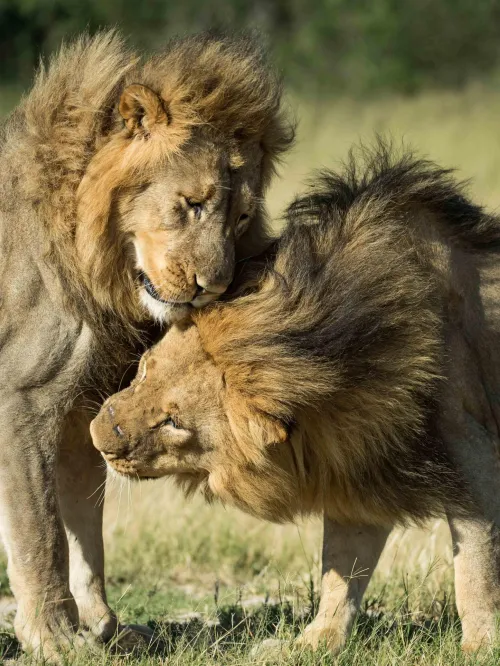Trophy hunting is an industry built on inexcusable animal cruelty for the purpose of human entertainment and bragging rights. Many animals hunted for trophies are shot by inexperienced hunters and animal suffering is not just celebrated but incentivised:
- Hunting with inhumane weapons such as bows and crossbows, muzzle loaders and handguns is encouraged in competitions run by the industry.
- Trophy hunters often prioritise maintaining the appearance of their trophy by making the animals bleed to death rather than “tarnishing” the trophy with additional bullet holes.
- Trophy hunters sometimes use bait to lure wildlife out of protected areas and can also use dogs to chase animals to exhaustion, putting both the target animals and the dogs at risk.
As well as causing suffering to sentient individual animals, scientific studies show that trophy hunting can also have negative impacts on species’ populations and social dynamics, as well as their ecosystems.
Elephants and other megafauna species that are long-lived, slow to reproduce, and/or live in societies with multi-generational groups or complex territory structures are especially at risk of the negative effects of trophy hunting.
Poor management and false claims
Many countries issue trophy hunting quotas even in the absence of accurate and up to date population estimates and insufficient knowledge about population dynamics. It is impossible to determine exactly how many animals are killed by trophy hunters globally due to the severe lack of transparency and regulations. Trophy hunting is big business and hunters can pay tens of thousands of dollars to get licenses to kill the most endangered and coveted animals. Legal trophy hunting can also drive demand and create cover for the illegal trade in wildlife.
Hunters’ claims of revenue contributions to communities and conservation from trophy hunting are exaggerated or misleading, the majority of funds generated by trophy hunting never reach conservation programmes or communities. If and when they do, such funds are negligible compared to the damage caused through the loss of irreplaceable wildlife.
Ethical alternatives
Trophy hunting is based on an economic model that incentivises the cruel and unsustainable exploitation of wildlife. It conflicts with and undermines the viability of ethical alternatives, including eco-tourism. There are many highly successful conservation programmes operating around the world, in countries including Kenya and Costa Rica, which do not involve killing the animals they are meant to protect.
Shutting down trophy trade globally
Due to the threats trophy hunting poses to people, animals, and habitats, many countries (e.g., Colombia, Costa Rica, India, Kenya, Malawi, Singapore, South Sudan) already prohibit trophy hunting in full or to a significant degree, while others (e.g., Argentina, Australia, Belgium, Canada, Finland, France, the Netherlands, the United States) have introduced national restrictions on imports of hunting trophies. 45 passenger and freight airline companies have prohibited the transport of some or all hunting trophies on their carriers, including the world’s top five largest airline groups.
How can we end trophy hunting?
Despite the fact that the vast majority (over 80%) of British people find the notion of trophy hunting abhorrent, dozens of hunting trophies from animals including lions, elephants, brown bears, leopards, hippos and cheetahs are shipped to the UK every year.
Lions are currently the most popular target for UK hunters. This July marks 10 years since Cecil the lion suffered for over 10 hours following his wounding by crossbow in 2015, before finally being put out of his misery. Despite enormous public and political support for a ban, trips to kill endangered animals are sold by hunting tour companies here in the UK.
A trophy import ban would create a major disincentive for British trophy hunters to travel abroad to kill animals. It would also send a strong global message that killing animals for ‘fun’ and bragging rights is utterly unacceptable. The UK’s Labour Government committed to banning hunting trophy imports, we are now rallying further public and political pressure for that to be delivered as soon as possible so we can stop this selfish, cruel and outdated trade.
Stop trophy hunting imports
A trophy import ban would create a major disincentive for British trophy hunters to travel abroad to kill animals
Photo by Alamy/

